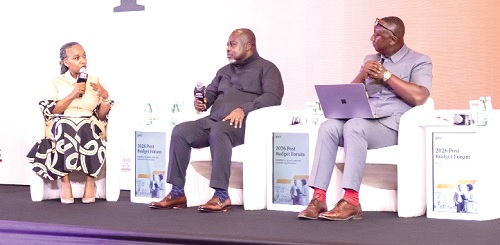
VAT reforms take effect January - GRA boss - Bill before Parliament
The full implementation of the Value Added Tax (VAT) reforms proposed in the 2026 Budget is expected to begin on January 1, next year, the acting Commissioner-General of the Ghana Revenue Authority (GRA), Anthony Kwasi Sarpong, has disclosed.
He said the bill, which was currently before Parliament, was on track for approval.
“The VAT reform is currently before Parliament, and we are hoping and expecting that we will get parliamentary approval before the Christmas season. We also hope that the President will be able to assent to it soon after,” he stated.
Speaking at the 2026 PwC Post Budget forum in Accra yesterday, Mr Sarpong said the timelines remained tight, but achievable, adding that all indications pointed to the reforms taking effect before the end of the year.
Operational adjustments
The Commissioner-General stressed that the GRA was mindful of the operational adjustments that businesses would need to make, especially those required to reconfigure their financial and digital systems ahead of the rollout.
“We will expand our documentation to guide first-time implementers and work closely with businesses to agree on a clear date. The aim is to ensure that everyone has adequate time to plan and prepare,” he stated.
Mr Sarpong gave an assurance that engagements with industry players would intensify in the coming weeks to facilitate a seamless transition into the new VAT regime.
The goal, he added, was to support businesses through the adjustment period, while enhancing revenue mobilisation in an efficient, transparent and minimally disruptive way.
2026 Post-budget forum
On the theme: “Resetting for growth, jobs and economic transformation,” the forum created a platform for players in the private sector and other stakeholders to examine the policy choices in the 2026 budget, reforms and opportunities ahead.
The event was attended by former Finance Minister, Seth Terkper; the Senior Country Partner of PwC Ghana, Vish Ashiagbor; the Tax Leader for PwC Ghana, Ayesha Bedwei-Ibe; and a Partner, Tax at PwC Ghana, Abeiku Gyan-Quansah.
To compensate for the removal of the one per cent COVID-19 levy, which would create a revenue gap of about GH¢3.7 billion in 2026, Mr Sarpong said GRA was putting some measures in place to shore up the revenue deficit.
The measures include enhanced tax compliance in key sectors, the expansion of audit coverage through professional firms, and the implementation of electronic fiscal devices for Value Added Tax (VAT) collection.
They are expected to help the authority meet its revised revenue targets for next year.
He said that although the government had committed to not introducing new taxes, it was leveraging enhanced tax enforcement and digital reforms to boost collections.
"Government policy has been deliberate in that we are not introducing new taxes. At the same time, taxes that businesses believe must go off are going. So yes, the COVID levy is gone, but there are measures that will ensure the revenues come in," he said.
Simplification
The Senior Country Partner of PwC Ghana, Vish Ashiagbor, said the proposed VAT reforms in the 2026 budget were major steps in the right direction, pointing out that stakeholders were waiting to see the final details once Parliament approves the bill.
However, he said their impact would depend on how effectively they simplified tax administration and enhanced compliance.
Mr Ashiagbor explained that initial provisions in the VAT Amendment Bill currently before Parliament aligned with long-standing concerns from the business community regarding system complexity and lack of transparency.
“We think it is broadly satisfactory.
The thrust of the reform efforts is simplification.
A lot of the time, it is not that people do not want to comply; it is because the systems get so complicated that it makes compliance difficult to achieve,” he stated.
Mr Ashiagbor further commended plans by GRA to work closely with businesses across the spectrum, ranging from small and medium-sized enterprises to large corporations, to ensure a smooth rollout when the reforms take effect in January next year.
“Most people want to comply, but sometimes they lack understanding or the requisite skills.
We are very happy to hear that beyond the legislation becoming effective, GRA will make a concerted effort to work with businesses to ensure that we all understand our obligations,” he stated.
